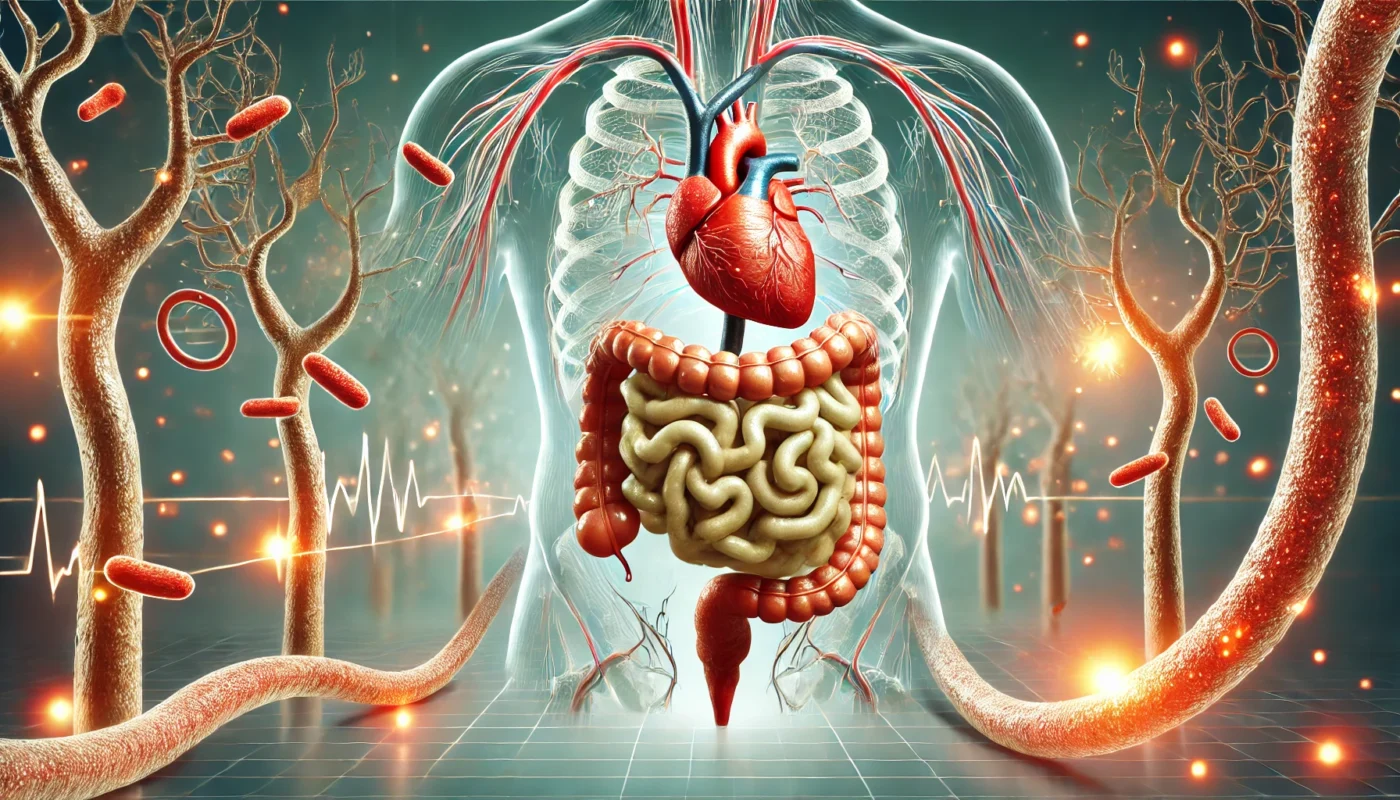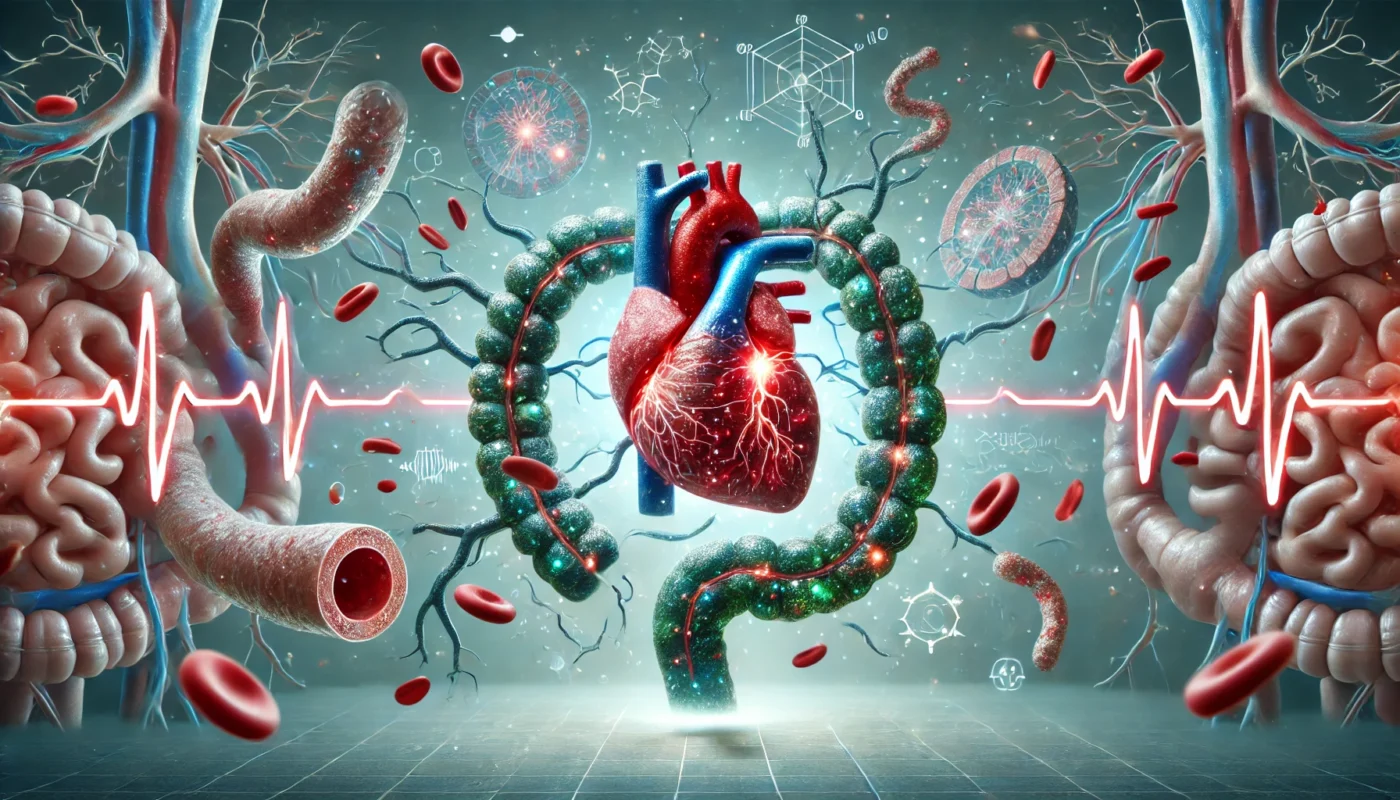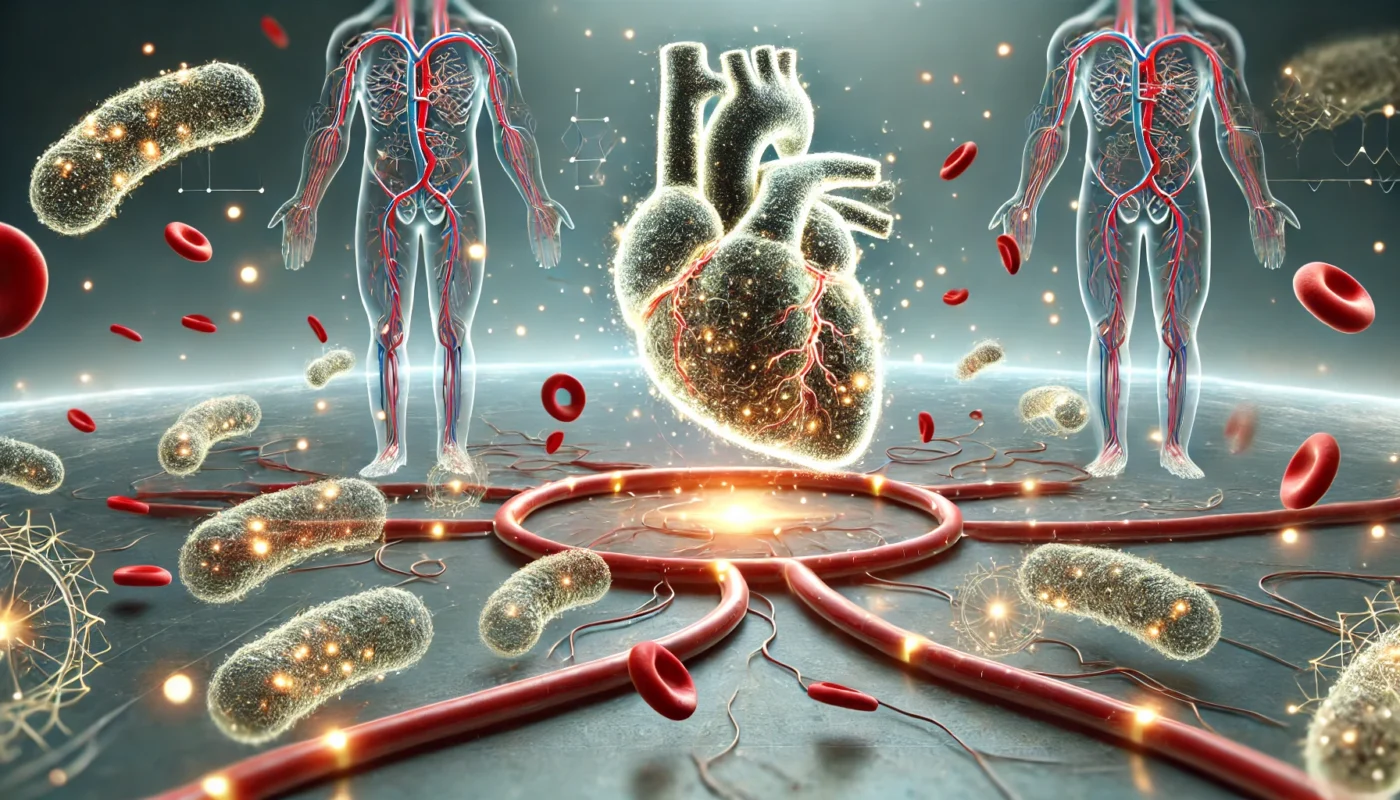Hypertension, commonly referred to as high blood pressure, is a leading global health concern, affecting more than 1.28 billion adults worldwide, according to the World Health Organization (WHO). While its causes have traditionally been attributed to genetic predisposition, diet, lifestyle, and environmental factors, emerging research highlights the role of gut microbiota as a significant contributor to blood pressure regulation. Gut microbiota—the trillions of microorganisms residing in the gastrointestinal tract—play an intricate role in maintaining overall health, influencing metabolic, immune, and cardiovascular functions. This article delves into the emerging evidence linking gut health and hypertension, explores the underlying mechanisms, and discusses future therapeutic possibilities targeting the gut microbiota.
You May Also Like: Hypertension Biomarkers: The Key to Personalized Medicine
Understanding Gut Microbiota and Its Connection to Health
What Is Gut Microbiota?
The gut microbiota is a complex ecosystem of bacteria, fungi, viruses, and other microorganisms that reside in the human gastrointestinal tract. These microbes help digest food, synthesize vitamins, regulate immune responses, and maintain the gut lining. A balanced gut microbiota, also known as eubiosis, supports overall health, while an imbalance, or dysbiosis, is associated with various conditions, including hypertension.
The Gut-Heart Axis
The gut-heart axis refers to the bidirectional relationship between gut microbiota and cardiovascular health. This connection is mediated by metabolic byproducts, immune signaling molecules, and neural pathways, suggesting that the gut microbiota plays a pivotal role in maintaining vascular homeostasis.

The Link Between Gut Microbiota and Hypertension
Research over the past decade has uncovered compelling evidence linking gut microbiota composition to blood pressure regulation. Key findings include:
1. Microbial Dysbiosis in Hypertension
Studies have consistently shown that individuals with hypertension often exhibit a less diverse gut microbiota compared to normotensive individuals.
- Evidence: A study published in Hypertension (2017) analyzed gut microbiota composition in hypertensive patients and found reduced levels of beneficial bacteria such as Lactobacillus and increased populations of pro-inflammatory microbes.
2. Production of Short-Chain Fatty Acids (SCFAs)
SCFAs, such as acetate, propionate, and butyrate, are byproducts of dietary fiber fermentation by gut bacteria. These compounds play a critical role in regulating blood pressure through anti-inflammatory and vasodilatory effects.
- Evidence: Research in Circulation Research (2019) demonstrated that SCFAs directly influence vascular function by interacting with G-protein-coupled receptors (GPCRs) on blood vessels, promoting vasodilation and lowering blood pressure.
3. Gut-Generated Metabolites and Blood Pressure
Certain metabolites produced by gut bacteria, such as trimethylamine-N-oxide (TMAO), are linked to hypertension and cardiovascular disease.
- Evidence: A study in Nature Medicine (2018) found that elevated levels of TMAO, a byproduct of gut microbial metabolism of choline and carnitine, were associated with increased blood pressure and arterial stiffness in hypertensive patients.
4. Immune System Interactions
Gut microbiota influence immune responses, which are critical in regulating inflammation—a key factor in hypertension. Dysbiosis can trigger low-grade chronic inflammation, contributing to vascular dysfunction and elevated blood pressure.
Mechanisms Linking Gut Microbiota to Hypertension
Several mechanisms explain how gut microbiota influence blood pressure:
1. Endothelial Function
SCFAs derived from gut bacteria enhance nitric oxide (NO) production, a molecule essential for maintaining endothelial function and vascular relaxation. Dysbiosis reduces SCFA production, impairing NO synthesis and promoting hypertension.
2. Renin-Angiotensin System (RAS) Modulation
The RAS is a hormone system that regulates blood pressure. Gut microbiota interact with this system by modulating angiotensin-converting enzyme (ACE) activity and influencing fluid balance.
- Evidence: A study in Hypertension Research (2020) found that gut microbiota modulation reduced ACE levels, contributing to blood pressure reduction in hypertensive animal models.
3. Gut Barrier Integrity
A healthy gut microbiota maintains the integrity of the intestinal barrier, preventing harmful substances like lipopolysaccharides (LPS) from entering the bloodstream. LPS leakage, a hallmark of dysbiosis, triggers systemic inflammation, leading to vascular dysfunction and hypertension.

Future Therapeutic Possibilities
Targeting gut microbiota offers a promising avenue for novel hypertension treatments. Emerging therapeutic strategies include:
1. Probiotics
Probiotics are live microorganisms that, when consumed in adequate amounts, confer health benefits. Certain probiotic strains, such as Lactobacillus and Bifidobacterium, have shown antihypertensive effects.
- Evidence: A meta-analysis in Nutrition, Metabolism & Cardiovascular Diseases (2018) found that probiotic supplementation reduced systolic blood pressure (SBP) by 3.56 mmHg and diastolic blood pressure (DBP) by 2.38 mmHg in hypertensive individuals.
2. Prebiotics
Prebiotics are dietary fibers that promote the growth of beneficial gut bacteria. Foods rich in prebiotics, such as garlic, onions, and asparagus, enhance SCFA production, supporting blood pressure regulation.
3. Postbiotics
Postbiotics are bioactive compounds produced by gut bacteria, including SCFAs and microbial enzymes. Supplementation with postbiotics offers a direct way to harness the benefits of gut microbiota.
4. Fecal Microbiota Transplantation (FMT)
FMT involves transplanting fecal material from a healthy donor to restore gut microbiota diversity. While still experimental, early studies suggest potential benefits for hypertension.
- Evidence: A study in Hypertension (2019) showed that FMT from normotensive donors reduced blood pressure in hypertensive animal models.
Dietary Strategies to Support Gut and Heart Health
1. Increase Fiber Intake
Dietary fiber feeds beneficial gut bacteria, promoting SCFA production and reducing inflammation.
- Sources: Whole grains, legumes, fruits, and vegetables.
2. Incorporate Fermented Foods
Fermented foods like yogurt, kefir, sauerkraut, and kimchi provide natural probiotics that enhance gut health.
3. Reduce Red Meat and Processed Foods
Red meat and processed foods are linked to higher TMAO production, which negatively impacts blood pressure.
4. Limit Sugar and Artificial Sweeteners
High sugar intake promotes dysbiosis, while some artificial sweeteners may negatively alter gut microbiota composition.

Nutritional Supplements for Hypertension and Gut Health
Nutritional supplements can complement dietary changes and support both gut health and blood pressure regulation. Below are five evidence-based options:
- Probiotics
Probiotics directly modulate gut microbiota, reducing inflammation and supporting blood pressure regulation. - Magnesium Glycinate
Magnesium relaxes blood vessels and reduces vascular resistance. A study in Magnesium Research (2016) reported a 5 mmHg reduction in systolic blood pressure with magnesium supplementation. - Omega-3 Fatty Acids
Omega-3s reduce inflammation and support vascular health. A meta-analysis in Hypertension (2018) found an average reduction of 4 mmHg in systolic blood pressure with omega-3 supplementation. - Hibiscus Extract
Hibiscus promotes vascular relaxation through nitric oxide production. The Journal of Nutrition (2010) reported a 6 mmHg reduction in systolic blood pressure with daily hibiscus tea consumption. - Coenzyme Q10 (CoQ10)
CoQ10 is an antioxidant that improves endothelial function. A clinical trial in Hypertension Research (2007) found an 11 mmHg reduction in systolic blood pressure with supplementation.
Conclusion
The gut microbiota has emerged as a key player in the complex mechanisms underlying hypertension. Dysbiosis, inflammation, and gut-derived metabolites significantly influence blood pressure regulation, highlighting the importance of maintaining a balanced gut microbiome. Future therapeutic strategies, including probiotics, prebiotics, postbiotics, and fecal microbiota transplantation, hold immense potential for improving cardiovascular health. By adopting gut-friendly dietary practices and exploring innovative treatments, individuals with hypertension can benefit from a holistic approach to blood pressure management that addresses the gut-heart axis. Continued research in this area promises to transform hypertension care and unlock new possibilities for prevention and treatment.

References
- Hypertension. (2017). Gut microbiota and its role in blood pressure regulation. Hypertension. Retrieved from https://www.ahajournals.org
- Circulation Research. (2019). Short-chain fatty acids and vascular function. Circulation Research. Retrieved from https://www.ahajournals.org
- Nature Medicine. (2018). TMAO and hypertension: Mechanisms and implications. Nature Medicine. Retrieved from https://www.nature.com/nm
- Nutrition, Metabolism & Cardiovascular Diseases. (2018). Probiotic supplementation and blood pressure: A meta-analysis. Nutrition, Metabolism & Cardiovascular Diseases. Retrieved from https://www.sciencedirect.com
- Hypertension Research. (2020). Fecal microbiota transplantation and its impact on blood pressure. Hypertension Research. Retrieved from https://www.nature.com/hr
Key TERMS for this article:
Hypertension, Gut Microbiota, Short-Chain Fatty Acids (SCFAs), Gut-Heart Axis, Dysbiosis, Probiotics, Renin-Angiotensin System (RAS)
Relevant and useful TAGS for this article:
Hypertension, Gut Microbiome, Blood Pressure, Gut-Heart Axis, Probiotics, Prebiotics, Inflammation, Vascular Health, SCFAs, Microbiome Therapies
Important Note: The information contained in this article is for general informational purposes only, and should not be construed as health or medical advice, nor is it intended to diagnose, prevent, treat, or cure any disease or health condition. Before embarking on any diet, fitness regimen, or program of nutritional supplementation, it is advisable to consult your healthcare professional in order to determine its safety and probable efficacy in terms of your individual state of health.
Regarding Nutritional Supplements Or Other Non-Prescription Health Products: If any nutritional supplements or other non-prescription health products are mentioned in the foregoing article, any claims or statements made about them have not been evaluated by the U.S. Food and Drug Administration, and such nutritional supplements or other health products are not intended to diagnose, treat, cure, or prevent any disease.

